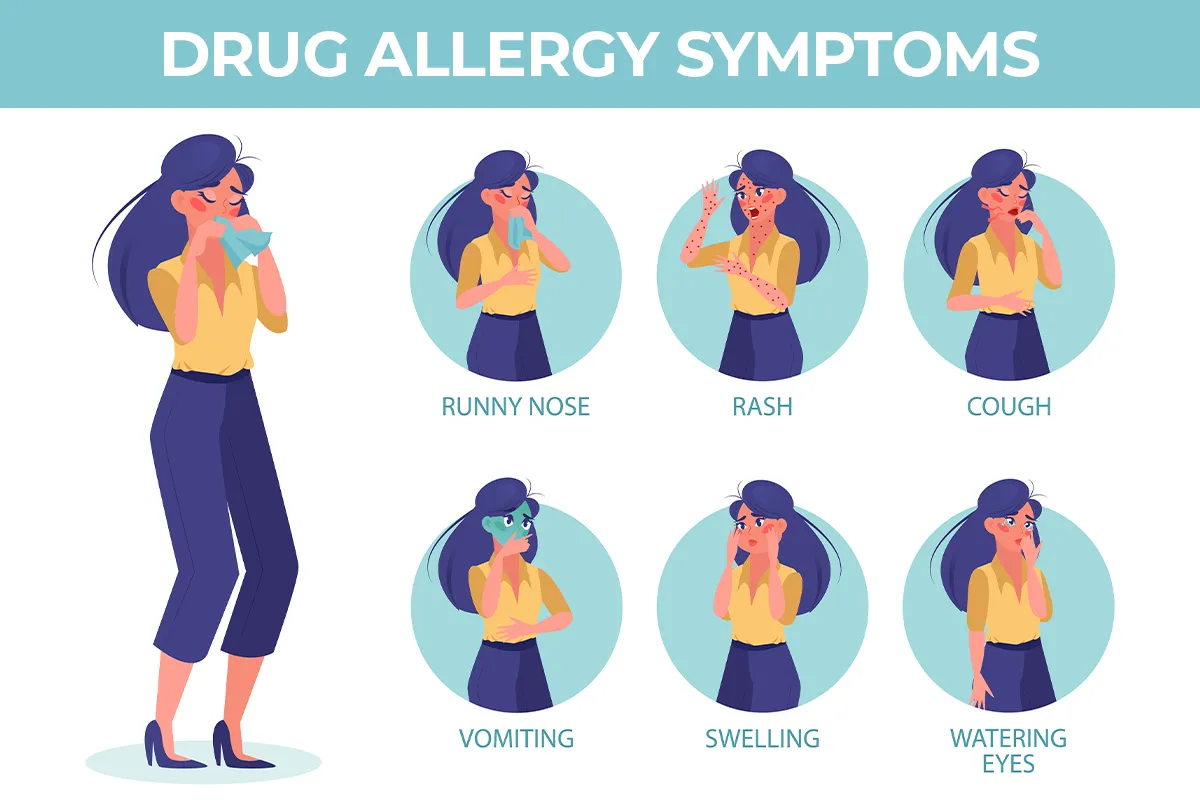Drug allergy
Find a doctorWhile most medications help your child heal, some can cause them to have an adverse reaction, ranging from mild side effects like hives to life-threatening anaphylaxis. We know how scary and confusing it can be if your child has a drug allergy. Our compassionate team is here to provide the expert care you need, from diagnosis to treatment, to help your child feel better and stay safe.
What is a drug allergy?
A drug allergy, or an allergic reaction to medication, happens when your immune system overreacts to a drug it sees as harmful. Drug allergies can develop from antibiotics, pain relievers and over-the-counter medications.
Unlike a drug intolerance, a drug allergy involves a reaction of the immune system where it misidentifies the medication as a threat. This response can lead to various symptoms, including allergic skin rashes, swelling or breathing difficulties. These reactions can occur even if you've taken the medication before without issues.
Drug allergy symptoms

If your child has an adverse drug reaction, their symptoms can vary from mild to severe and typically appear within minutes to hours after taking the medication.
Signs your child may have an allergic reaction to medication include:
- Hives, itching or a rash
- A dry cough and watering of the eyes
- Vomiting
- Swelling of the face, lips or tongue
- Anaphylaxis, a life-threatening reaction that can cause difficulty breathing, a drop in blood pressure and loss of consciousness
If you or your child are experiencing severe symptoms such as anaphylaxis, seek emergency care immediately.
What are the most common drug allergies?
Certain medications are more likely to cause your child to have an allergic reaction than others. Common drugs that cause a reaction include:
- Antibiotics: Penicillin and related drugs are among the most frequent drug allergies, with symptoms such as rashes, swelling, and severe anaphylactic reactions.
- Nonsteroidal anti-inflammatory drugs (NSAIDs): Medications like ibuprofen and aspirin can sometimes cause allergic responses.
- Chemotherapy drugs: Some cancer treatments can lead to hypersensitive reactions.
- Anticonvulsants: Medications for epilepsy or other neurological conditions may cause drug rash or other symptoms.
- Morphine and related pain relievers: Allergic responses to opioids, often called a morphine allergy, may lead to itching, hives, or swelling.
What's the difference between a drug allergy and a drug intolerance?
Though they’re often confused, drug allergies and drug intolerances aren’t the same. A drug allergy involves an immune system causing an allergic reaction to a drug, leading to symptoms such as hives, swelling, or anaphylaxis.
On the other hand, drug intolerance refers to the body’s inability to digest or process a medication, causing non-immune system symptoms such as nausea, diarrhea, or stomach pain.
What causes a drug allergy?
A drug allergy results from a hypersensitive immune system. When exposed to a medication, your body may mistakenly identify it as harmful and release antibodies to attack it. This reaction can occur the first time or after repeated exposure.
Common triggers for a drug allergy include:
- Having a family history of allergies, such as being allergic to antibiotics.
- Having an autoimmune disorder or a compromised immune system due to an infection, cancer, or vitamin deficiency.
- Taking certain medications frequently, such as antibiotics or pain relievers.
Your child’s pediatrician may refer you to a child rheumatologist to rule out an autoimmune disorder.
Testing for drug allergies
Your child’s pediatrician will review their medical history and perform a physical exam. Allergy specialists may use one or more tests to confirm whether the symptoms are caused by an allergic reaction to medication. These tests include:
- Skin tests: Small amounts of the suspected drug are placed on or under the skin to check for a reaction.
- Blood tests: These can detect immune responses linked to allergic reactions to drugs.
- Drug challenges: Under close supervision, a doctor may give small doses of the medication to observe reactions, if any.
Testing is particularly helpful for children with an allergy to penicillin or other antibiotics, as avoiding these medications unnecessarily can limit treatment options.
Treatment for a drug allergy
Treatment for your child’s drug allergy will focus on relieving symptoms and preventing future reactions. Discontinuing the drug causing the reaction is the first step in managing a drug allergy. Antihistamines, corticosteroids, or epinephrine may be prescribed to treat symptoms ranging from mild hives to severe anaphylaxis.
In cases where a medication like penicillin might be essential to treatment, doctors may use a process to gradually introduce the drug in small doses under supervision.
Get care
Kid-focused. Close to home. We're here for your child in person and online.





